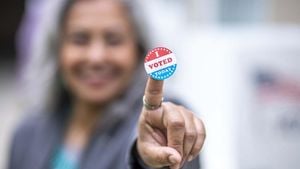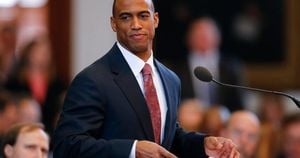Donald Trump is gearing up to return to his immigration policies from his first term, and he's bringing along some familiar faces to make it happen. With aspirations of executing the largest deportation effort in U.S. history, Trump has appointed key players who have long supported hardline positions on immigration. Among them are Stephen Miller, designated as White House deputy chief of staff, Tom Homan, set to be the "border czar," and Kristi Noem, named as secretary of Homeland Security. Together, they form what could be the backbone of Trump’s anticipated aggressive immigration agenda as his administration regains control.
Miller is ready to pick up where he left off during Trump's first tenure. He was pivotal during the previous administration, advocating for severe measures on immigration, including family separations. His task now involves crafting viable policies aimed at achieving Trump's promises, albeit under the looming threat of legal challenges from various fronts. Miller has indicated use of substantial raids targeting undocumented workers, and he plans to implement massive law enforcement involvement for such operations. His terminology has been quite clear: this would entail coordinating efforts between federal and local agencies, even utilizing the National Guard.
During previous statements, Miller touched on reviving contentious policies like endangering the Deferred Action for Childhood Arrivals (DACA) program, as well as pushing for agreements to have asylum seekers remain outside U.S. borders during application processes. He has suggested invoking public health laws to deny asylum claims based on spurious health concerns, effectively creating barriers to entry for many.
On the other hand, Tom Homan’s prospects are unsettling for many. He has consistently pushed the narrative of deportation being not only necessary but desirable. Homan plans to enact what he describes as "targeted arrests," focusing on individuals linked to criminal activity. He reassured audiences, stating, "It’s not going to be mass sweeps of neighborhoods," though skepticism remains about how this will be manifested on the ground. Homan had previously led the Immigration and Customs Enforcement (ICE) and is now set to bring those experiences back to the forefront.
Homan’s perspective on the matter seems to shift between acknowledging the enormity of the task—mass deportations—and framing it as part of public safety measures. He highlighted the danger posed by illegal immigrants, particularly those with felony convictions, stating there’s no shortage of criminal elements to target. With Trump’s renewed focus on immigration, Homan claims his initial steps will involve targeting violent offenders who lack legal status.
Then there's Kristi Noem, who has aligned herself with Trump's vision for immigration, supporting aggressively anti-immigrant policies throughout her governorship. While she will need Senate confirmation for her position, her connection with tumultuous border politics aligns well with the agenda Trump plans to push forward. During her governorship, Noem has taken firm stances against accepting refugees and actively supported measures to fortify borders within her state, making her the perfect candidate for managing the country’s southern border.
Collectively, this trio has plans to reshape the current immigration framework, asserting authority over local jurisdictions. Trump’s administration previously faced opposition from cities like Los Angeles (L.A.), known for being sanctuary cities, which actively protect undocumented immigrants. L.A. recently reinforced its commitment to this status by implementing policies shielding residents from federal immigration crackdowns, outlining the importance of unity and safety for all. Local authorities, including the Mayor, have expressed resistance to any efforts likened to mass deportations.
Despite this, Homan responded resolutely, saying his work wouldn’t be deterred by local ordinances, proclaiming, "Federal law trumps state and local law every time." He views the pushback as unproductive, promising to send additional resources to cities resistant to his directives. This suggests escalation between federal and local officials, raising alarms about the potential overreach of Trump's new policies.
Calls for resistance against the envisioned immigration crackdowns are already gaining ground across various cities. Detractors have pointed out the negative societal impacts these measures tend to invoke, including heightened fear among immigrant communities and economic repercussions stemming from the loss of undocumented workers who contribute significantly to labor markets, particularly within industries reliant on their labor.
Critics of the planned crackdown have emphasized the consequences of targeting immigrants. Many local leaders stand firm, stating, "We won’t cooperate with federal policies requiring local law enforcement to function as federal agents." This resonates strongly with pro-immigrant advocacy groups and individuals concerned about the societal ripple effects of Trump’s anticipated policies.
But members of Trump’s administration, including Homan, dismiss these concerns as motivation derived from political and social agendas, disregarding the glaring issues of public safety they cite. During interviews, Trump’s aides insist they are merely fulfilling the will of the American electorate, framing the immigration debate through the lens of national security.
The tone is set for what seems to be the next phase of conflict between Trump's administration and local jurisdictions centered on immigration and safety. Rapid responses will soon emerge, and with newly appointed officials at the helm, sparks are expected to fly as President Trump’s showpiece proposal, mass deportation, is prepared for rollout as the clock ticks toward his return to the White House. The stage is set where the confrontation between federal authority and local governance could well rewrite the narrative of American immigration policy.
With tensions mounting and both sides gearing up for battle, the political ramifications of implementing these hard-lined tactics could create waves far beyond the borders. The echo of discontent from communities wary of impending chaos holds the promise of future protests as grass-roots movements rise to prominence, aiming to protect immigrant populations and challenge the rhetoric surrounding them. Will local jurisdictions stand steadfast against federal pressures, or will they acquiesce under the weight of enforcement? Only time will tell as America braces for another contentious chapter of its immigration saga, one where the specter of mass deportation looms large.



